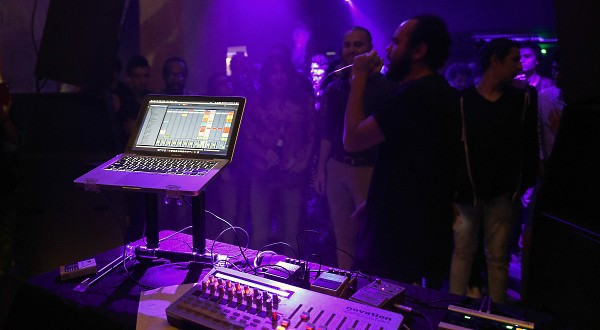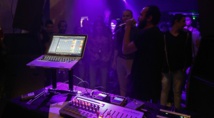The movement began in the mid-2000s as musicians bypassed record labels to reach their listeners directly via the web.
It was boosted by Egypt's 2011 uprising which toppled longtime dictator Hosni Mubarak.
"This movement began finding an audience because it has become accessible on the internet, instead of the market being dominated by those who release CDs," says Tamer Abu Ghazaleh, a Cairo-born Palestinian musician who co-founded Ma3azef, an online Arab music magazine.
From the second half of the 2000s, musicians have used websites such as SoundCloud, YouTube, and Facebook to publish and promote their music.
That has challenged record labels' traditional gatekeeper role between artists and audiences.
"This is the first time in Egypt, at least since the 1920s, where music really represents the people in a direct way, without any intermediary," says Mahmoud Refat, founder of record label 100Copies Music.
- Working-class beats -
The birth of Mahraganat music around the same period also reflected this shift in the industry.
Emerging from working-class neighbourhoods, it became Egypt's most listened-to genre -- with little involvement from record companies.
Using cheap or free software, young men began mixing traditional Egyptian music with electronic sounds, creating loud, eclectic beats.
Meanwhile, artists began networking online, says musician Rami Abadir, who released his first official album with Canadian record label D.M.T. Records in May.
"This didn't exist until 2009 or 2010, or it existed but on a very small scale," he says.
The genre found a small but growing audience in a country where according to the United Nations, 40 percent of the population is between 10 and 20 years old.
The 2011 revolution boosted the movement.
"A lot of things took a push with what happened in 2011 and 2012 and the revolution," says Maurice Louca, composer of the acclaimed 2014 electronic album Benhayyi Al-Baghbaghan (Salute the Parrot).
While most of the music was non-political, a security void made it easier to open spaces and organise festivals.
"There was a very nice atmosphere where anyone who wanted to do anything, could just do it," says Abadir.
Egypt's first free presidential election in 2012 brought to power Islamist President Mohamed Morsi, who was ousted by the army a year later.
Human rights groups have accused then-army chief General Abdel Fattah al-Sisi, who went on to become President, of limiting freedom of expression.
Venues like Vent, which opened in 2013, promoted new, experimental music.
Many have since closed, but several still hold regular live sessions.
While many musicians have second jobs to make a living, some have been able to go full-time and performed at home and abroad.
Saleh has performed up to five times a month this year, including gigs with Alexandria-based psychedelic and electronic rock band Telepoetic.
Louca has given 50 concerts overseas this year alone.
- Broader tastes -
As the artists diversified, so did listeners' tastes.
Now, the audience "is receptive to this and waiting for new things... especially in Egypt," says Abu Ghazaleh.
Some tracks by Egyptian hip-hop artists Abyusif and Ahmed Kamel have been played more than a quarter of a million times on SoundCloud.
"Hip-hop in Egypt is like that. Its first and last place is the internet," says Refat, whose label caters to independent and Mahraganat musicians.
That contrasts with the 1990s, when authorities cracked down on concerts and accused attendees of practising Satanism, according to Louca.
"We felt like we were in an absolute desert," he says.
While the scene centres around Cairo, other musicians in the region have flourished online.
"We kind of found it staggering the amount of talent around, and a lot of people doing what we consider to be very high-quality music," says Abdel-Rahman Hussein, co-founder of Dandin, a Middle East music platform.
Hip-hop artists from Lebanon, Syria, and Jordan have collaborated, while cross-genre projects have mushroomed in Beirut, says Ziad Nawfal, co-founder of the independent Lebanese label Ruptured.
The wave of new music "expresses real things for the people," says Abu Ghazaleh. "This is what this music is doing, so it has no place to go but grow further."
---------------------------------------------------------------------------------------------------------------
It was boosted by Egypt's 2011 uprising which toppled longtime dictator Hosni Mubarak.
"This movement began finding an audience because it has become accessible on the internet, instead of the market being dominated by those who release CDs," says Tamer Abu Ghazaleh, a Cairo-born Palestinian musician who co-founded Ma3azef, an online Arab music magazine.
From the second half of the 2000s, musicians have used websites such as SoundCloud, YouTube, and Facebook to publish and promote their music.
That has challenged record labels' traditional gatekeeper role between artists and audiences.
"This is the first time in Egypt, at least since the 1920s, where music really represents the people in a direct way, without any intermediary," says Mahmoud Refat, founder of record label 100Copies Music.
- Working-class beats -
The birth of Mahraganat music around the same period also reflected this shift in the industry.
Emerging from working-class neighbourhoods, it became Egypt's most listened-to genre -- with little involvement from record companies.
Using cheap or free software, young men began mixing traditional Egyptian music with electronic sounds, creating loud, eclectic beats.
Meanwhile, artists began networking online, says musician Rami Abadir, who released his first official album with Canadian record label D.M.T. Records in May.
"This didn't exist until 2009 or 2010, or it existed but on a very small scale," he says.
The genre found a small but growing audience in a country where according to the United Nations, 40 percent of the population is between 10 and 20 years old.
The 2011 revolution boosted the movement.
"A lot of things took a push with what happened in 2011 and 2012 and the revolution," says Maurice Louca, composer of the acclaimed 2014 electronic album Benhayyi Al-Baghbaghan (Salute the Parrot).
While most of the music was non-political, a security void made it easier to open spaces and organise festivals.
"There was a very nice atmosphere where anyone who wanted to do anything, could just do it," says Abadir.
Egypt's first free presidential election in 2012 brought to power Islamist President Mohamed Morsi, who was ousted by the army a year later.
Human rights groups have accused then-army chief General Abdel Fattah al-Sisi, who went on to become President, of limiting freedom of expression.
Venues like Vent, which opened in 2013, promoted new, experimental music.
Many have since closed, but several still hold regular live sessions.
While many musicians have second jobs to make a living, some have been able to go full-time and performed at home and abroad.
Saleh has performed up to five times a month this year, including gigs with Alexandria-based psychedelic and electronic rock band Telepoetic.
Louca has given 50 concerts overseas this year alone.
- Broader tastes -
As the artists diversified, so did listeners' tastes.
Now, the audience "is receptive to this and waiting for new things... especially in Egypt," says Abu Ghazaleh.
Some tracks by Egyptian hip-hop artists Abyusif and Ahmed Kamel have been played more than a quarter of a million times on SoundCloud.
"Hip-hop in Egypt is like that. Its first and last place is the internet," says Refat, whose label caters to independent and Mahraganat musicians.
That contrasts with the 1990s, when authorities cracked down on concerts and accused attendees of practising Satanism, according to Louca.
"We felt like we were in an absolute desert," he says.
While the scene centres around Cairo, other musicians in the region have flourished online.
"We kind of found it staggering the amount of talent around, and a lot of people doing what we consider to be very high-quality music," says Abdel-Rahman Hussein, co-founder of Dandin, a Middle East music platform.
Hip-hop artists from Lebanon, Syria, and Jordan have collaborated, while cross-genre projects have mushroomed in Beirut, says Ziad Nawfal, co-founder of the independent Lebanese label Ruptured.
The wave of new music "expresses real things for the people," says Abu Ghazaleh. "This is what this music is doing, so it has no place to go but grow further."
---------------------------------------------------------------------------------------------------------------









 Home
Home Politics
Politics











